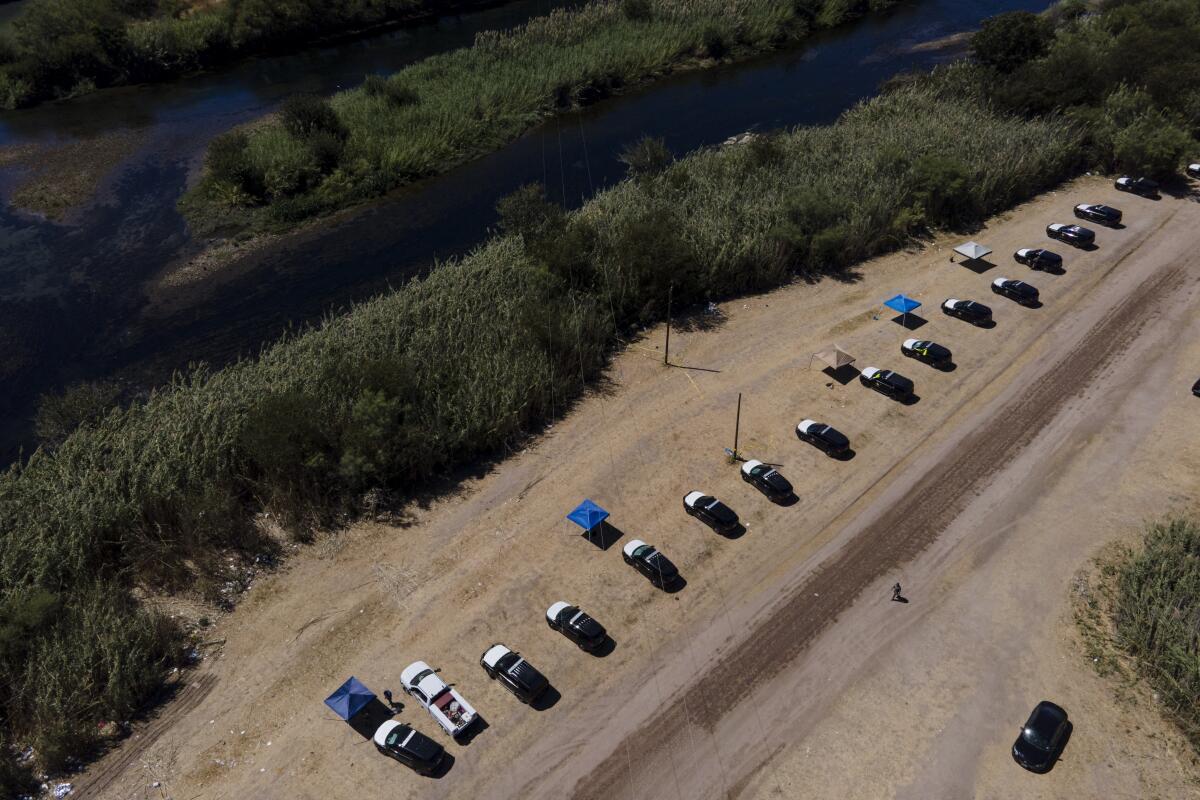U.S. to allow some Venezuelan migrants to enter. Others will be sent to Mexico

- Share via
Some Venezuelan migrants will be allowed to enter the U.S. and stay legally for up to two years, the Biden administration announced Wednesday.
Venezuelans who cross the Mexican border without authorization, however, will be turned back.
The program, which will be capped at 24,000 migrants, is similar to one implemented for Ukrainians after the Russian invasion, officials said. Each migrant will need a sponsor in the U.S. who guarantees financial support for the person. After their applications are approved, they would fly here.
“These actions make clear that there is a lawful and orderly way for Venezuelans to enter the United States, and lawful entry is the only way,” Homeland Security Secretary Alejandro N. Mayorkas said in a statement. “Those who attempt to cross the southern border of the United States illegally will be returned to Mexico and will be ineligible for this process in the future. Those who follow the lawful process will have the opportunity to travel safely to the United States and become eligible to work here.”
The program is seen within the administration as a way to slow the rising numbers of migrants crossing the border without authorization.
In the last fiscal year, which ended in September, U.S. Customs and Border Protection recorded more than 2 million encounters with migrants at the border — a record high.
In recent months, an increasing number of border crossers have been asylum seekers from Venezuela, Cuba and Nicaragua. Many have been processed by border agents and released to pursue their asylum claims within the U.S.
The increasing number of migrants at the border has placed political pressure on the administration, as states such as Texas have sent buses full of migrants to cities including Washington and New York. U.S. officials framed Wednesday’s announcement as an effort to work with Mexico to address the problem.
“The actions the United States and Mexico are announcing today are intended to address the most acute irregular migration and help ease pressure on the cities and states receiving these individuals,” the Department of Homeland Security said in a news release.
Cubans and Venezuelans are more difficult to deport than people of other nationalities, due to strained U.S. relations with those countries. U.S. officials have been unable to send them back to their home countries in significant numbers.
A draft version of the new policy had included migrants from Haiti, Nicaragua and Cuba, according to documents obtained by The Times.
It’s unclear why only Venezuela ended up in the final version. U.S. officials noted that the program could be expanded in the future.
Due to deteriorating economic conditions and an authoritarian government, a quarter of Venezuela’s population has left the country. In the last year, U.S. border officials counted on average more than 15,000 Venezuelans crossing the border each month. The number rose to 33,000 in September.
Administration officials hope that creating an orderly process for Venezuelans to enter the U.S. will discourage migrants from crossing the border without authorization, lessening the load on overwhelmed Border Patrol agents.
For an administration that largely has been focused on rolling back Trump-era restrictions at the border, this measure appears to be a new approach.
The Venezuelan immigrant community in the U.S. is not large, and migrants could have a difficult time finding sponsors.
Once the program launches, Venezuelans who travel through Mexico or Panama without authorization will not be eligible. Those who have been deported from the U.S. within the last five years also will not be eligible.
Requiring migrants to arrive by plane or other safer routes could dissuade them from hiking through the Darien Gap, a jungle between Colombia and Panama that UNICEF describes as one of the most dangerous routes in the world.
Venezuelans who do not go through the new process and who cross the southern border without authorization could be expelled to Mexico under Title 42, a public health law invoked during the pandemic.
In recent months, U.S. officials have been negotiating with Mexican officials to accept Venezuelans under Title 42.
Biden administration officials have made a point to highlight the increase in migrants from Venezuela, Nicaragua and Cuba. In August, migrants from the three countries were apprehended 50,000 times by border agents.
“Failing communist regimes in Venezuela, Nicaragua, and Cuba are driving a new wave of migration across the Western Hemisphere, including the recent increase in encounters at the southwest U.S. border,” U.S. Customs and Border Protection Commissioner Chris Magnus said in a statement in September.
Under the new policy, a person wanting to sponsor a Venezuelan migrant would submit an application to U.S. Citizenship and Immigration Services.
If the application is approved, migrants will receive information about how to enter the country legally. U.S. officials will vet them for security risks.
They will be expected to arrange their own flights and can apply for work permits. If their asylum or other immigration claim is not approved, they will have to leave the country in most cases.
More to Read
Sign up for Essential California
The most important California stories and recommendations in your inbox every morning.
You may occasionally receive promotional content from the Los Angeles Times.














